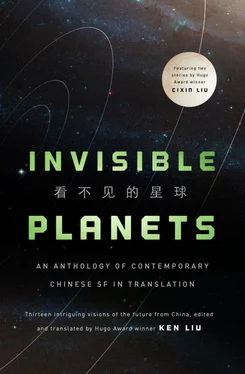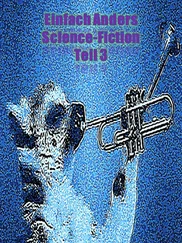The picture stays still for a while. Stunned by the sudden turn of events, we don’t know what to do. Snow Lotus suddenly begins to run. Everything in front of us is shaking violently. She runs toward the balcony, toward that patch of open night sky.
This time I don’t miss. Before she leaps into nothingness, I restrain her. Snow Lotus stops like a frozen flower and falls heavily against the floor. Angrily she screams, struggles, and finally howls in desperation.
Death is the best placebo.
In this instance, I agree with this view.
* * *
Sirens shatter the dawn in Shazui Village. Accompanied by the police, Big Sister Shen and I walk through the crowd and duck into the police car. Snow Lotus is sitting in the back of another car, handcuffed. From the side, her porcelain cheeks are lit alternately by flashes of blue and red. She does not lift her head.
Eyes lowered, the roar of the engine in her ears, her silhouette trembles, blurs, and then disappears into the distance.
I recall the first time I spoke with Snow Lotus, and I begin down the long road of regret.
As an undergraduate, Xia Jia majored in Atmospheric Sciences at Peking University. She then entered the Film Studies program at the Communication University of China, where she completed her Master’s thesis, “A Study on Female Figures in Science Fiction Films.” Recently, she obtained a Ph.D. in Comparative Literature and World Literature at Peking University, with Fear and Hope in the Age of Globalization: Contemporary Chinese Science Fiction and Its Cultural Politics (1991–2012) as the title of her dissertation. She now teaches at Xi’an Jiaotong University.
She has been publishing fiction since college in a variety of venues including Science Fiction World and Jiuzhou Fantasy . Several of her stories have won the Galaxy (Yinhe) Award and Nebula (Xingyun) Award, China’s most prestigious science fiction honors. In English translation, she has been published in Clarkesworld and Upgraded , both edited by Neil Clarke. “A Hundred Ghosts Parade Tonight” won an honorable mention in the Science Fiction and Fantasy Translation Awards in 2013 and was selected by editor Rich Horton for his “Year’s Best” anthology.
Xia Jia describes her own style as “porridge SF,” in contrast to the perennial (and, in my opinion, pointless) debate over the distinction of “hard SF” from “soft SF.” (These terms have slightly different meanings in the Chinese SF community than the Anglophone SF community. Generally, “hard SF” in Chinese refers to the inclusion of more technical material.) Her stories in this anthology, “A Hundred Ghosts Parade Tonight,” “Tongtong’s Summer,” and “Night Journey of the Dragon-Horse,” showcase the range of her style. Reviewer Lois Tilton described “A Hundred Ghosts” as “literary science fiction… where exceptional prose mingles the tropes of SF and fantasy and inform us that such distinctions are not so important.” [6] http://www.locusmag.com/Reviews/2012/02/lois-tilton-reviews-short-fiction-early-february-2/
“Night Journey of the Dragon-Horse” is a brand-new story that has never been published in English.
Besides writing fiction, Xia Jia is also a brilliant translator from English into Chinese. Her translations, like her own writing, are lucid, elegant, and graceful. Her translation of my novella, “The Man Who Ended History,” is in many ways an improvement on the original.
In 2014, Xia Jia became the first Ph.D. in China with a specialization in science fiction. Her academic work on Chinese science fiction has been called groundbreaking, and she has presented her results in China as well as abroad. The critical essay she provided at the end of this book tries to tackle the question of what makes Chinese science fiction Chinese. (Most of her academic work is published under the name “Wang Yao,” as “Xia Jia” is a pen name used mainly for fiction.)
Xia Jia is also a filmmaker, actress, painter, and singer.
A HUNDRED GHOSTS PARADE TONIGHT
AWAKENING OF INSECTS, THE THIRD SOLAR TERM:
Ghost Street is long but narrow, like an indigo ribbon. You can cross it in eleven steps, but to walk it from end to end takes a full hour.
At the western end is Lanruo Temple, now fallen into ruin. Inside the temple is a large garden full of fruit trees and vegetable patches as well as a bamboo grove and a lotus pond. The pond has fish, shrimp, dojo loaches, and yellow snails. So supplied, I have food to eat all year.
It’s evening, and I’m sitting at the door to the main hall, reading a copy of Huainanzi, the Han Dynasty essay collection, when along comes Yan Chixia, the great hero, vanquisher of demons and destroyer of evil spirits. He’s carrying a basket by the crook of his elbow, the legs of his pants rolled all the way up, revealing calves caked with black mud. I can’t help but laugh at the sight.
My teacher, the Monk, hears me and walks out of the dark corner of the main hall, gears grinding, and hits me on the head with his ferule.
I hold my head in pain, staring at the Monk in anger. But his iron face is expressionless, just like the statues of the buddhas in the main hall. I throw down the book and run outside while the Monk pursues me, his joints clanging and creaking the whole time. They are so rusted that he moves as slowly as a snail.
I stop in front of Yan, and I see his basket contains several new bamboo shoots, freshly dug from the ground.
“I want to eat meat,” I say, tilting my face up to look at him. “Can you hunt some buntings with your slingshot for me?”
“Buntings are best eaten in the fall when they’re fat,” says Yan. “Now is the time for them to breed chicks. If you shoot them, there won’t be buntings to eat next year.”
“Just one, pleeeeease?” I grab onto his sleeve and act cute. But he shakes his head resolutely, handing me the basket. He takes off his conical sedge hat and wipes the sweat off his face.
I laugh again as I look at him. His face is as smooth as an egg, with just a few wisps of curled black hair, like weeds that have been missed by the gardener. Legend has it that his hair and beard used to be very thick, but I’m always pulling a few strands out now and then as a game. After so many years, these are all the hairs he has left.
“You must have died of hunger in a previous life,” Yan says, cradling the back of my head in his large palm. “The whole garden is full of food for you. No one is here to fight you for it.”
I make a face at him and take the basket of food.
The rain has barely stopped; insects cry out from the wet earth. A few months from now, green grasshoppers will be jumping everywhere. You can catch them, string them along a stick, and roast them over the fire, dripping sweet-smelling fat into the flames.
As I picture this, my empty stomach growls as though already filled with chittering insects. I begin to run.
* * *
The golden light of the evening sun splatters over the slate slabs of the empty street, stretching my shadow into a long, long band.
I run back home, where Xiao Qian is combing her hair in the darkness. There are no mirrors in the house, so she always takes off her head and puts it on her knees to comb. Her hair looks like an ink-colored scroll, so long that the strands spread out to cover the whole room.
I sit quietly to the side until she’s done combing her hair, puts it up in a moon-shaped bun, and secures it with a pin made of dark wood inlaid with red coral beads. Then she lifts her head, reattaches it to her neck, and asks me if it’s sitting straight. I don’t understand why Xiao Qian cares so much. Even if she just tied her head to her waist with a sash, everyone would still think she’s beautiful.
Читать дальше












